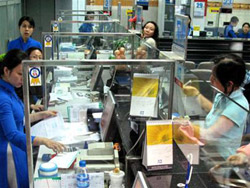
| Banks lower rates, but can firms qualify for loans? | |
Two major State-owned commercial banks have further cut lending interest rates to as low as 14 per cent per year, but many companies maintain that it is difficult to qualify for loans. Agribank was the first to drop interest rates yesterday, cutting borrowing costs for farming households to 14.4 per cent per year – down six-tenths of a percentage point. Loan rates to SMEs were also lowered eight-tenths of a point to 15 per cent annualy. The Bank for Investment and Development of Viet Nam (BIDV) quickly followed suit, cutting domestic-currency loan rates by one percentage point, bringing short-term borrowing costs to 15 per cent per year for all borrowers. Longer-term rates were cut to 15.8 per cent. The Ha Noi-based State-owned bank will also offer a 14-per-cent lending rate for manufacturers of essential goods with stable consumer markets, as well as for small- and medium-sized enterprises (SMEs) and exporters and export producers . In particular, BIDV said it had earmarked VND3 trillion (US$178.6 million) for lending to rice exporters and exports producers. For loans in US dollars, lending rates were also cut by half-a-percentage point, with loans of less than three months now carrying a 5-per-cent rate, and longer-term loans a 5.5-per-cent rate. Responding to these moves, State Bank of Viet Nam governor Nguyen Van Giau said that lending rates of 1.1-1.25 per cent per month were expected to create more favourable conditions for enterprises to approach banks for loans, although prevailing lending rates among private commercial banks still averaged at around 17.5 per cent per year. Vu Tien Dung, chairman of the Hoang Vu Co, a producer of stainless steel products, complained that, despite news that banks had more money to lend and at lower interest rates, lenders were still imposing strict lending conditions which made approaching banks for loans far from easy. Viet Nam International Bank (VIB Bank) deputy director Dao Minh Anh commented, "Banks always want to pump capital into the market to earn a profit, but we really need to consider whether borrowers can pay back loans. The vital weakness in most loan applications is a business plan with potential," said Anh. In HCM City, about 85.6 per cent of loan applications received by banks since September have been approved, according to the State Bank branch in HCM City. Rejected applications typically related to financing purchases of automobiles, luxury goods, or export goods with prices being undercut by import products. Financing for projects deemed ineffective or risky was also being rejected. "The prudence of banks is understandable," Giau said. "Banks borrow money to lend, so they always have to think twice to select the best borrowers in order to ensure their own sustainable development, especially following the collapses of a number of banking giants worldwide." The State Bank reported that up to 80.8 per cent of loan applications did not meet lending conditions. It also found that over 2 per cent of banks had failed to properly appraise collateral, the remaining banks made sound lending decisions consistent with regulations. The State Bank, Giau said, would continue to lower interest rates and make exchange rates more flexible in order to ease inflation, free up credit and stimulate the economy. In addition to borrowing capital, Giau urged enterprises to review their business plans and cut input costs where they can. | |
| VNS |
